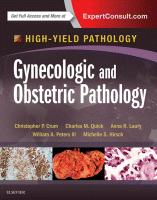Physical Address
304 North Cardinal St.
Dorchester Center, MA 02124

D efinition — An early form of clear-cell neoplasia with malignant cytology and the absence of invasion. Clinical Features Epidemiology Clear-cell tumors of this type typically present as adenofibromas that can arise de novo or from within endometriotic cysts. Uncommon…

PITFALL D efinition — A rare tumor variant with classic carcinoma and yolk sac differentiation. Clinical Features Epidemiology Extremely rare, limited to isolated reports or small case series. Broad age range but most are postmenopausal, averaging in the early 50s.…

D efinition — A malignant, endometriosis-associated epithelial tumor. Clinical Features Epidemiology Uncommon. Distinct gene expression profile. Present in postmenopausal women with a mean age in the 50s. You’re Reading a Preview Become a Clinical Tree membership for Full access and…

D efinition — An invasive ovarian carcinoma with a transitional growth pattern that contains areas of benign or borderline Brenner tumor. Clinical Features Epidemiology Rare. Can present at a range of ages, but the mean age is in the 60s.…

D efinition — A benign ovarian tumor composed of cells resembling transitional epithelium of the urinary tract. Clinical Features Epidemiology Uncommon but seen periodically in practice. Brenner tumors may represent up to 5% of benign epithelial tumors of the ovary.…

D efinition —A morphologic spectrum of tumors arising in endometriosis and displaying a müllerian (rather than intestinal) phenotype. Clinical Features Epidemiology Rare, reports limited to small series. Associated with borderline neoplasia usually serous or mucinous. Most present in the fourth…

D efinition — Noninvasive epithelial and stromal tumors with an atypical endometrioid epithelial component. Clinical Features Epidemiology Uncommon but not exceedingly rare; less than 200 reported cases but most pathologists will encounter at some point in their practice. Similar to…

D efinition — A benign epithelial and stromal tumor with an endometrioid epithelial component. Clinical Features Epidemiology Rare; these lesions represent less than 1% of all benign ovarian tumors. Most common in postmenopausal patients or women in their late reproductive…

D efinition — An adenocarcinoma typically derived from endometriosis and displaying well to moderate differentiation. Clinical Features Epidemiology Approximately 40% of low-stage tumors are associated with endometriosis. Those with endometriosis tend to be younger than those without. Approximately 5% associated…

D efinition — Marked intramucosal atypia in a borderline mucinous tumor of the ovary. Clinical Features Epidemiology The second most common epithelial tumor of the ovary and 12% to 15% of ovarian tumors. Approximately 10% of mucinous tumors are borderline.…